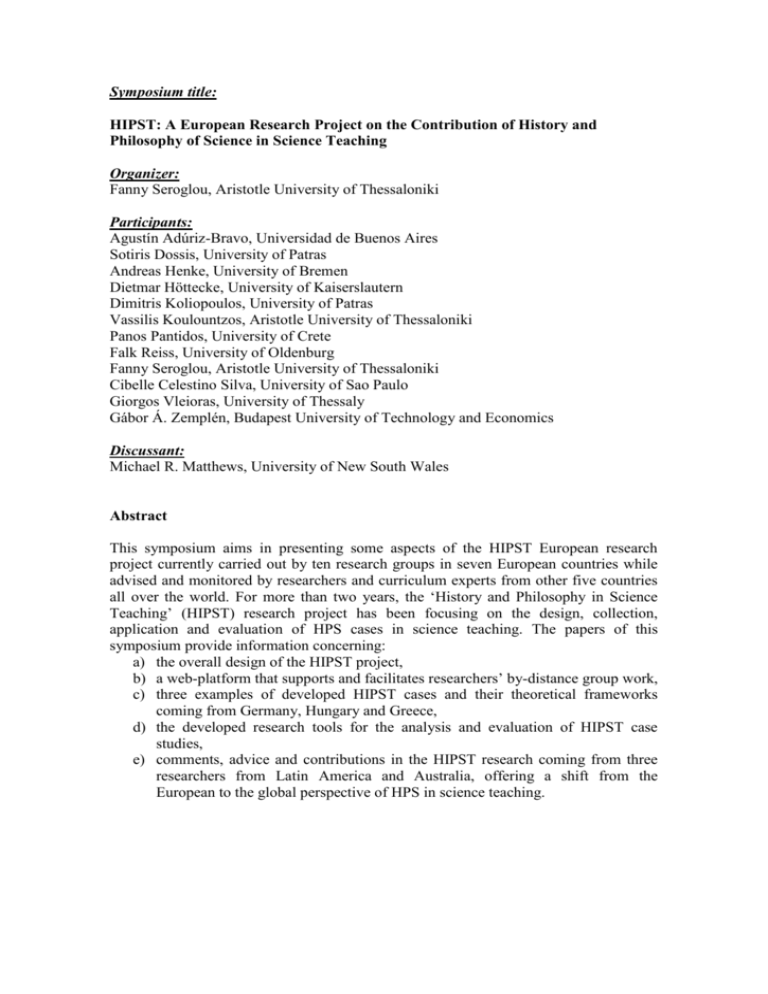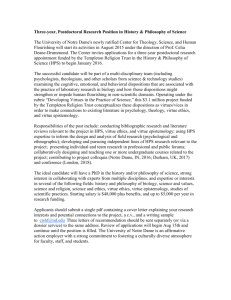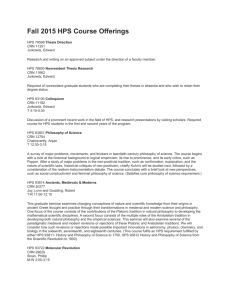Historical Case Studies to Teach the Argumentative Nature of Science
advertisement

Symposium title: HIPST: A European Research Project on the Contribution of History and Philosophy of Science in Science Teaching Organizer: Fanny Seroglou, Aristotle University of Thessaloniki Participants: Agustín Adúriz-Bravo, Universidad de Buenos Aires Sotiris Dossis, University of Patras Andreas Henke, University of Bremen Dietmar Höttecke, University of Kaiserslautern Dimitris Koliopoulos, University of Patras Vassilis Koulountzos, Aristotle University of Thessaloniki Panos Pantidos, University of Crete Falk Reiss, University of Oldenburg Fanny Seroglou, Aristotle University of Thessaloniki Cibelle Celestino Silva, University of Sao Paulo Giorgos Vleioras, University of Thessaly Gábor Á. Zemplén, Budapest University of Technology and Economics Discussant: Michael R. Matthews, University of New South Wales Abstract This symposium aims in presenting some aspects of the HIPST European research project currently carried out by ten research groups in seven European countries while advised and monitored by researchers and curriculum experts from other five countries all over the world. For more than two years, the ‘History and Philosophy in Science Teaching’ (HIPST) research project has been focusing on the design, collection, application and evaluation of HPS cases in science teaching. The papers of this symposium provide information concerning: a) the overall design of the HIPST project, b) a web-platform that supports and facilitates researchers’ by-distance group work, c) three examples of developed HIPST cases and their theoretical frameworks coming from Germany, Hungary and Greece, d) the developed research tools for the analysis and evaluation of HIPST case studies, e) comments, advice and contributions in the HIPST research coming from three researchers from Latin America and Australia, offering a shift from the European to the global perspective of HPS in science teaching. Symposium paper No 1: Developing and Implementing Case Studies for HPSST Framework, Preliminary Results, and Critical Perspectives of a European Approach for the Inclusion of History and Philosophy in School Science Teaching DIETMAR HÖTTECKE1 and FALK RIESS2 1 Working Group on Didactics of Physics, Dep. of Physics, University of Kaiserslautern D-67663 Kaiserslautern, Germany. 2 Working Group on Physics Education and History of Science, Dep. of Physics, University of Oldenburg, D-26111 Oldenburg, Germany. Abstract Despite the fact that many curricula all over the world demand for an inclusion of history and philosophy of science (HPS), the degree of effective implementation is rather low. Central problems are a lack of effective and suitable materials for teaching and learning, teachers’ believes that HPS is an add-on of science education, and a lack of didactical knowledge on how to teach HPS. Student-centered methods like inquiry learning, experiments with replicas, open-ended discussions or role-play activities are far from being widely implemented. The European project HIPST (History and Philosophy in Science Teaching) aims at a contribution to close the gap between curricular objectives and actual practice of science teaching. Ten partners from all over Europe collaborate in order to develop and refine case studies for teaching and learning with and about HPS. Project outcomes will provide an enriched basis for an effective implementation of HPS. The developmental process combines bottom-up and top-down strategies where researchers, science teachers and experts from science museums join to several thematic working groups. Each of the groups brings their special expertise, knowledge, and interests into the developmental process. Case studies developed within these groups are tested, evaluated and refined in schools. In each of the participating countries national conferences including persons from school administration were held in order to analyze national conditions. The talk focuses on the framework and guiding ideas of HIPST. Exemplary results will be discussed in order to reflect the developmental process. Symposium paper No 2: Hosting and Facilitating Researchers’ Group Work in Atlaswiki Web-Based Environment: The Greek HIPST Group VASSILIS KOULOUNTZOS and FANNY SEROGLOU ATLAS Research Group, School of Primary Education, Faculty of Education, Aristotle University of Thessaloniki, 54124 Thessaloniki, Greece. Abstract The Greek HIPST group works in the context of the European HIPST research project. The group consists of fourteen researchers in science education, and has to discuss, work and interact at a regular basis although people come from various areas of Greece. The fourteen researchers of the group have designed, developed and communicated on atlaswiki by distance instructional e-material inspired by the history and philosophy of science and have presented a variety of activities such as: experiments, role-plays, discussions, debates and teaching strategies that have been designed in the context of theoretical frameworks previously developed by them and realize a three dimensional cognitive, meta-cognitive and emotional approach of teaching science. Each activity has been supported by videos, guidelines, descriptions, worksheets, historical texts and theoretical resources. Atlaswiki offers a dynamic environment for researchers, and teachers involved in the HIPST project to collaboratively design and produce new instructional e-material by distance. In the first six months of 2009 the application of the case studies will be implemented on at many Greek schools all over the country. The monitoring of the discussions and interactions since June 2008 and the study of qualitative data coming from the discussions and the developed e-material as well as quantitative data offers multiple perspectives to understand the way researchers interact with each other, with the designers and facilitators of the atlaswiki and with the atlaswiki environment itself. Furthermore, much fruitful information is brought forward concerning the various ways researchers and teachers perceive and realize in their instructional material, teaching strategies and classroom applications the use of history and philosophy of science in science teaching. Symposium paper No 3: Historical Case Studies to Teach the Argumentative Nature of Science GÁBOR Á. ZEMPLÉN1 and AGUSTÍN ADÚRIZ-BRAVO2 1 Department for Philosophy and History of Science, Budapest University of Technology and Economics (BME). Budapest, Hungary. 2 Grupo de Epistemología, Historia y Didáctica de las Ciencias Naturales (GEHyD), Centro de Formación e Investigación en Enseñanza de las Ciencias (CeFIEC), Facultad de Ciencias Exactas y Naturales (FCEyN), Universidad de Buenos Aires (UBA). Buenos Aires, Argentina Abstract In this paper, we discuss the possibilities and limits of using the history of science as a background to design instructional units aimed at teaching the argumentative nature of science. Among the constraints, we discuss evidence from educational and psychological research in the last decades; such evidence suggests that some curricular expectations appear to be met by only some high ability students, and not the whole student population. Even this limited success depends to a large extent on the specific teaching environment (including: instructions given by teachers, and task structure, phrasing and setting). We then discuss the influence of various approaches to teaching argumentation and how different (contradictory) views on argumentation in science influence nature-of-science teaching. In the second part, we discuss the possibilities of historical case studies as suitable scenarios to teach various aspects of argumentation. We investigate how a variety of argumentative situations –including internal monologues in the discovery process, rhetorical techniques in publications, scientific controversies in a core group, and debates on socio-scientific issues in the public sphere– can be utilised when teaching the nature of science through what we call ‘histories of science’. Our aim is to develop a combined typology that explores the compatibility of: 1. historical case studies; 2. approaches to argumentation; 3. teaching environments; and 4. expected gains in science education. Our effort might help approximate two promising approaches within didactics of science, one focusing on incorporating the history of science, and the other on strengthening the role of argumentation in nature-ofscience education. Symposium paper No 4: Case Studies for HPSST – Exemplary Results of the HIPST project in Germany ANDREAS HENKE1 and DIETMAR HÖTTECKE2 1 Institute for Science Education, Dep. of Physics, P.O. Box 330440, University of Bremen, D-28334 Bremen, Germany. 2 Working Group on Didactics of Physics, Dep. of Physics, University of Kaiserslautern D-67663 Kaiserslautern, Germany. Abstract The European project HIPST (History and Philosophy in Science Teaching) aims at a contribution to close the gap between curricular objectives and actual practice of science teaching. Ten partners from all over Europe collaborate in order to develop and refine case studies for teaching and learning with and about HPS. The presentation focuses on exemplary case studies, which are developed, evaluated and refined by the German group of this international project. It will be shown how student-centered activities enrich teaching and learning about NOS with history and philosophy of science. Among others role-play activities and guided inquiry tasks with historical replicas are central. Since research has indicated the necessity of explicit reflection on NOS topics, the group has designed new methods and media to reach this ambitious aim. It will be demonstrated how to engage students in creative writing activities as well as openended discussions via a so-called “reflection corner”. The talk mainly focuses on cases studies drawn from the early history of electricity and mechanics. These examples are developed in close cooperation with a group of German physics teachers. This developmental methodology ensures that the materials designed by the group meet the needs, expectations and boundary conditions of the teachers’ everyday practice of teaching science. Symposium paper No 5: The Use of Texts from the History of Physics as Tools for the Investigation of Pupils’ Conceptions: A Case Study Concerning the Teaching of the Simple Pendulum DIMITRIS KOLIOPOULOS and SOTIRIS DOSSIS Department of Educational Sciences and Early Childhood Education, University of Patras. The subject of this paper is linked to a broader empirical research study regarding how 13-14-year-old Greek pupils understand whether, why and how it is possible to measure time with the help of a simple pendulum. Two complementary methods are used in order to trace the pupils’ conceptions: the review, with the help of a pertinent questionnaire, and the group observation technique. In the present work we will be presenting data related to the conceptual and methodological dimension of scientific knowledge which originate in group observation technique. This technique consists in the documentation of a discussion between pupils and researchers in the context of “situations/problems” posed to the pupils on the occasion of the pupils’ commentary of two texts of historical content. The first text contains extracts from Galileo’s book Dialogue Concerning Two New Sciences and is related to the paradox of the isochronous motion of the simple pendulum. The second one refers to a description of the discovery by the astronomer J. Richer concerning the delay of a pendulum clock as a consequence of its being moved from Paris to the city of Cayenne in French Guyana, on the Equator. The rich conclusions produced by our case study, show that texts from the history of physics when embodied into science education research case studies may provide efficient methodological tools for the investigation of the conceptions expressed by students of the concepts and methodology of physics. Symposium paper No 6: Some Boundary Conditions Regarding the Implementation of HPS in Science Teaching CIBELLE CELESTINO SILVA Institute of Physics of Sao Carlos, University of Sao Paulo, Av. Trabalhador Sancarlense, 400, Sao Carlos, SP, 13565-590, Brazil. Abstract HIPST (History and Philosophy in Science Teaching) is a European project involving partners from several countries. The project develops teaching practices and case studies aiming at effective implementation of HPS at schools. Since the case studies will be translated into several languages and disseminated to be used in different national conditions, it is relevant to understand boundary conditions involved in the implementation of such material. Usually HPS in ST is discussed from a north-western perspective. In this paper, I bring the discussion to a broader perspective, including Latin American view about it. Although national conditions are quite different concerning education policies and teacher training level, there are similar problems which should be taken into account. Among them, I would like to focus on teachers’ historical, philosophical and didactical knowledge and the relevance of developed activities to the learning of specific scientific contents. Teachers’ and scholars’ believes about what counts as proper HPS and NOS teaching differ radically; therefore it should be explicitly admitted that knowledge undergoes “didactic transposition” and changes from experts to teachers and, then, to students in order to work towards more realistic approaches in introducing HPS in science teaching. Developed material should be useful to fostering teachers’ learning. At same time, they are designed for students and must hold a clear connection to school scientific contents. Furthermore, teachers are rarely familiar on how to manage didactical practices suggested by HIPST as role play and inquiry practical activities, hence the development of teachers’ abilities are as relevant as the development of activities themselves. Symposium paper No 7: Developing Research Tools for the Analysis and the Evaluation of Case Studies Concerning the Contribution of History and Philosophy of Science in Science Teaching FANNY SEROGLOU1, GEORGIOS VLEIORAS2 and PANAGIOTIS PANTIDOS3 1 ATLAS Research Group, School of Primary Education, Faculty of Education, Aristotle University of Thessaloniki, 54124 Thessaloniki, Greece. 2 Department of Primary School Education, University of Thessaly, 38221 Volos, Greece. 3 Department of Preschool Education, University of Crete, 74100 Rethymnon, Greece. Abstract There is a demand for developing research tools for the analysis and evaluation of instructional material and activities for science teaching that are inspired and/or informed by the history and philosophy of science. Such research tools should provide us with quantitative and qualitative ways to measure the contribution of history and philosophy of science in science teaching. We attempt to join expertise from science education, developmental psychology and classroom semiotics in order to design and develop a questionnaire and a framework of analysis for the study and analysis of research data coming from the field of history and philosophy of science in science teaching. Both research tools are currently activated in the context of the evaluation of the HIPST research project and aim on recording and analyzing data concerning natureof-science understanding, science related attitudes and values, interest/motivation and self-concept in science learning. The developed questionnaire is used for pre- and postHIPST case application data gathering, while the developed framework that is called EVA (an acronym for Education Via Adaptation) and combines nature-of-science from science education with classroom semiotics is used for the analysis of videotaped data during HIPST case applications. In this paper, we are presenting fruitful interpretations coming from the study and analysis of the flow of data before, during and after the application of HIPST cases, challenging a discussion concerning research design in the field of history and philosophy of science in science teaching.







